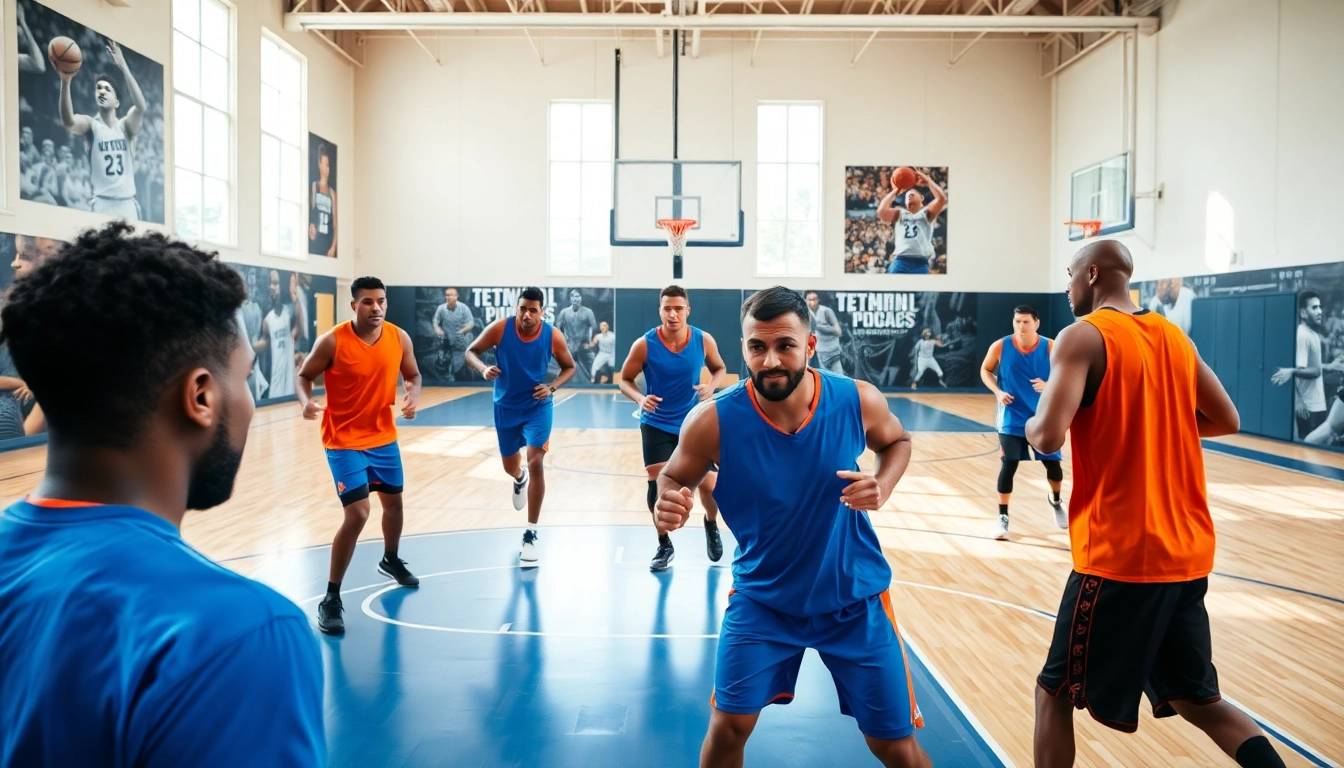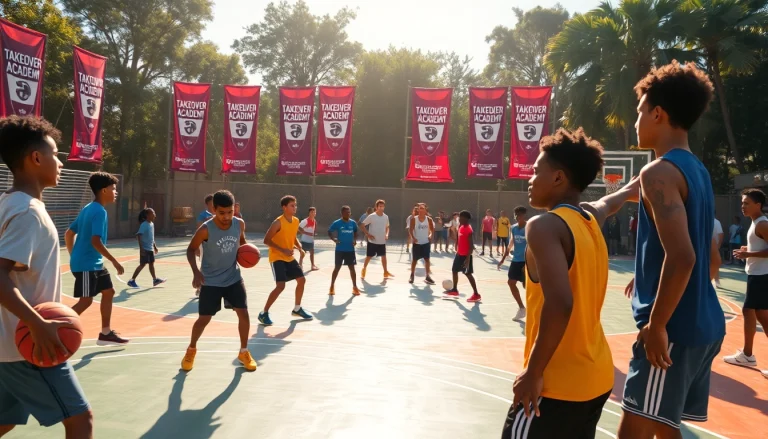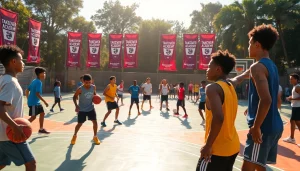Understanding Basketball Training Programs
What Are Basketball Training Programs?
Basketball training programs are structured regimens designed to enhance players’ skills, physical conditioning, and tactical understanding of the game. These programs can be tailored to different skill levels, from beginners learning the fundamentals to advanced players looking to refine specific abilities. Most training programs include various elements such as drills, fitness routines, and competitions to ensure comprehensive player development. For some of the best basketball training programs available today, you can visit best basketball training programs that suit your needs and aspirations.
The Importance of Skill Development
Skill development lies at the heart of basketball training. Players must master fundamental techniques such as dribbling, shooting, passing, and defense, which form the basis for more advanced tactics. Beyond technical skills, training programs often focus on cultivating physical attributes like speed, agility, and endurance—essential components that contribute to overall performance on the court. Improving these skills can lead to increased confidence, better game performance, and enhanced enjoyment of the sport.
Different Types of Training Programs
Basketball training programs can broadly be categorized into several types:
- Individual Training: Tailored sessions focusing on personal skill development, often with a trainer.
- Group Training: Sessions involving multiple players, allowing for competitive drills and team-based activities.
- Camps and Clinics: Intensive training events held over a short period, usually focused on specific skills or age groups.
- Online Training: Virtual programs that players can follow at home, featuring videos and guided sessions.
Evaluating the Best Basketball Training Programs
Criteria for Top Programs
When assessing the effectiveness of different basketball training programs, several key criteria should be considered:
- Qualified Coaches: Programs led by experienced coaches or athletes who can provide expert guidance.
- Structured Curriculum: A well-organized training structure that covers a comprehensive range of skills.
- Player Development Focus: Emphasis on individual progress and specific skill enhancement over time.
- Positive Feedback and Success Stories: Testimonials from past participants that indicate success and satisfaction with the program.
- Accessibility: Availability of training options, including location, scheduling, and online formats.
Comparative Analysis of Training Approaches
Different training programs may utilize various methodologies, each with its advantages and potential drawbacks. For example, some programs may emphasize high-intensity workouts to build physical fitness, while others might focus on skill drills that encourage technical proficiency. A comparative analysis of these approaches helps players discern which method aligns with their personal goals and learning styles. It’s essential to critically evaluate how each program’s training philosophy resonates with individual aspirations, whether it’s improving shooting accuracy, enhancing ball-handling skills, or increasing overall game IQ.
How to Choose the Right Program for You
Selecting the right training program is a highly personal decision. Here are some steps to help find the best fit:
- Assess Personal Goals: Identify what you want to achieve—be it skills improvement, increased fitness, or preparing for competitions.
- Research Available Programs: Look into various training locations, their offerings, and the coaching staff.
- Visit and Observe: If possible, attend a session to see how programs operate and if they match your expectations.
- Consider Scheduling: Ensure the program’s timing fits into your routine without causing stress or conflict.
Notable Basketball Training Programs to Consider
Overview of Leading Programs
Many basketball training programs have gained recognition for their success in player development. Programs like Evolution Basketball Training and Pro-Fit Basketball Training provide extensive training options from personalized sessions to intensive camps. They are known for their emphasis on individual skill development and competitive play. Additionally, platforms like Pure Sweat Basketball and Jordan Lawley offer online courses that allow players to train at their convenience while receiving expert insights.
Success Stories of Program Graduates
Success stories from graduates of these programs often highlight the impact of targeted training. Many athletes credit their participation in structured training environments for not only elevating their games but also for guiding them to collegiate or professional opportunities. Coaches often share testimonials indicating how skills learned in training have directly translated to improved performances in competitive settings.
Program Features and Pricing
Features of training programs vary widely and could include:
- Personalized Coaching: One-on-one sessions tailored to the individual player’s needs.
- Video Analysis: Reviewing gameplay footage to submit feedback and strategies.
- Strength and Conditioning Clinics: Programs dedicated to enhancing physical fitness as it relates to basketball performance.
- Flexible Payment Options: Various pricing arrangements, including pay-per-session, monthly subscriptions, or packages for extended programs.
Prices for basketball training programs can range significantly based on their structure and location. Typically, individual training sessions may cost between $50 to $150 each depending on the coach’s experience, while camps can vary from $200 to over $1,000 depending on duration and included features.
Implementing Training Techniques Effectively
Creating a Consistent Training Schedule
Establishing a consistent training schedule is crucial for effective skill development. Players should allocate specific days and times solely for basketball training, ensuring these slots become priority commitments. Consistent practice helps reinforce skills and fosters a deeper understanding of the game.
Monitoring Progress and Adaptation
Regularly measuring progress is essential to determine if training objectives are being met. Keeping detailed records of performance metrics—like shooting percentages, assist-to-turnover ratios, or fitness benchmarks—can provide insight into areas needing improvement. Adjusting techniques based on progress data ensures that players remain on course towards their goals.
Integrating Feedback for Improvement
Feedback from coaches, peers, or self-assessment is invaluable during the training process. Constructive criticism helps identify both strengths and weaknesses, guiding players on what areas to focus on next. Engaging with feedback openly and proactively is a key attitude for growth.
The Future of Basketball Training Programs
Trends Shaping Basketball Training
Emerging trends in basketball training programs indicate a shift towards more personalized, data-driven approaches. With advancements in sports technology, players can now access real-time analytics of their performance, allowing for tailored training regimens based on precise insights. Additionally, the rise of virtual training platforms provides opportunities for skill enhancement from anywhere, making quality training more accessible than ever.
Technological Advances in Training
Technological integration—such as the use of wearables, video analysis software, and training apps—has revolutionized how players train. For instance, training applications track performance data and offer tailored workout suggestions, while virtual reality systems can simulate game conditions allowing players to practice in varied, realistic scenarios without being on the court.
What to Expect in Upcoming Training Sessions
As basketball training continues to evolve, participants can expect training sessions to become increasingly engaged, utilizing a blend of traditional coaching strategies and innovative technology. Programs will likely incorporate more dynamic drills that focus on game situations, improved analytics for individualized feedback, and community collaboration among players to facilitate learning and growth.








